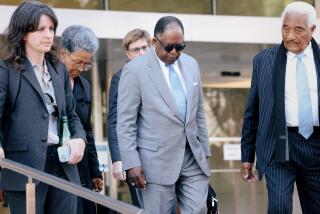Enron Jurors See Greed as Factor
Several of the jurors who will decide the fate of former Enron Chairman Kenneth L. Lay and Chief Executive Jeffrey K. Skilling told the judge during the jury selection process that they felt greed was involved in the energy-trading company’s December 2001 collapse.
“Anybody that takes home the salaries and the bonuses and stuff that they have, they got to be greedy or they wouldn’t do that,” said one juror, a man who works for Pasadena-based Jacobs Engineering Group Inc.
Still, all eight women and four men chosen for the jury in the federal conspiracy and fraud trial said that they could keep an open mind in judging Lay and Skilling. “I know greed is not a crime,” explained a man who works for Shell Group.
After a rapid, one-day selection process Monday, a jury was seated that includes at least three people who work in the oil and oil-services industries, a third-grade teacher, a woman who has been laid off from jobs four or five times, and a woman who works in Houston criminal courts and knows several of the lawyers involved in the trial.
Most of the questioning was done at the judge’s bench, out of earshot of the reporters and members of the public who crowded into court to witness jury selection. However, transcripts released later in the week give a flavor of who the jurors are and what is on their minds -- although the judge and lawyers did their best to keep the jurors anonymous.
Lay, 63, and Skilling, 52, are accused of conspiring to deceive the public about Enron’s deteriorating financial condition and of lying in public statements and, in Skilling’s case, in official financial reports. If convicted, they could spend decades in prison.
Defense lawyers tried repeatedly to have the trial moved from Enron’s hometown of Houston, where they said residents still had painful memories of the thousands of lost jobs and decimated nest eggs that followed the company’s downfall.
Lay and Skilling had been so “demonized” by the local news media, their lawyers argued, that an impartial jury would be impossible to find.
U.S. District Judge Sim Lake rejected that view and several times during questioning of potential jurors rejected efforts by the defense to get people thrown off the panel because of their views about Enron and its former leaders.
Michael W. Ramsey and Daniel M. Petrocelli, lead lawyers for Lay and Skilling, respectively, both said they were reasonably satisfied with the jury, although they would have preferred more time for questioning.
One theme that emerged from the questioning is that the nation’s fourth-largest city is still something of a small town.
One juror’s ex-boyfriend is a friend of Lay’s sister, Sharon. Another’s parents are members of Lay’s country club, although that juror said of Lay: “I couldn’t pick him out of a lineup.” Several others had friends or acquaintances who worked at Enron.
A woman who works at Schlumberger, the oilfield-services giant, said that she admired the bravery of Sherron S. Watkins, the former Enron manager who sent Lay a memo in August 2001 warning that the company could implode “in a wave of accounting scandals.”
Ramsey asked whether she would therefore give Watkins, who is expected to testify for the prosecution, “a little more weight as a witness in your mind than an ordinary witness?”
No, the woman said, adding: “I’ve even wondered if she had any involvement in it.”
An exchange between Judge Lake and the Jacobs Engineering employee was typical of the way the judge tried to probe beneath opinions that prospective jurors had voiced in a lengthy questionnaire sent out months before the trial. Lake noted that the juror spotlighted greed as a factor in the Enron case.
Lake: “Do you mean by greed that they’re committing some crime?”
Juror: “I think they’re stretching the legal limits on it. I’m not sure. I’m not going to say that they’re all crooks, but, you know....”
Lake: “Do you think anybody who is a CEO of a big company is probably a crook?”
Juror: “No, I didn’t say that.... I just said they walk a line that stretches sometimes the legality of something. They stretch points.”
Petrocelli asked the judge to dismiss the juror on grounds of bias, but Lake refused.
“Almost no potential juror comes to trial as a blank slate,” said Mark C. Zauderer, a jury expert and partner at Flemming Zulack Williamson Zauderer in Manhattan. “In fact, you wouldn’t want jurors who don’t have opinions. People who have no life experience bring nothing to the job.”
It’s the job of the judge to “surgically examine” potential jurors’ views to make sure that they can be fair despite the opinions they hold, Zauderer said.
An unusual aspect of the Lay-Skilling trial is that Lake specifically instructed the jury that there is no assigned seating. So from day to day, or even from morning to afternoon, they sit in different seats in the jury box, with regular jurors and alternates mixed together. It is more typical for the regular jurors to sit in seats one through 12, taking the same seat each time, with the alternates in seats 13 to 16.
Juror seating is completely within the judge’s discretion, Zauderer said, and he applauded Lake’s practice.
“You’re trying to make the jurors comfortable,” he said. “Letting them sit where they choose is a good way of communicating that their job is important and they are important.”
Lake has also decreed that the trial, which is expected to last as long as four months, will run on a Monday-to-Thursday schedule.
More to Read
Inside the business of entertainment
The Wide Shot brings you news, analysis and insights on everything from streaming wars to production — and what it all means for the future.
You may occasionally receive promotional content from the Los Angeles Times.










